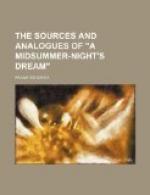Being come thither, he hurled the money on the ground, saying, “This is the most pleasing bargain that ever I made;” and going to embrace Robin, Robin took him up in his arms and carried him forth; first drew him through a pond to cool his hot blood, then did he carry him where the young married couple were, and said, “Here is your uncle’s consent under his hand; then, here is the ten pounds he gave you, and there is your uncle: let him deny it if he can.”
The old man, for fear of worse usage, said all was true. “Then am I as good as my word,” said Robin, and so went, away laughing. The old man knew himself duly punished, and turned his hatred into love, and thought afterward as well of them as if she had been his own. The second part shall show many incredible things done by Robin Good-fellow (or otherwise called Hob-goblin) and his companions, by turning himself into divers sundry shapes.
THE SECOND PART OF ROBIN GOOD-FELLOW, COMMONLY CALLED HOB-GOBLIN
HOW ROBIN GOOD-FELLOW HELPED A MAID TO WORK
Robin Good-fellow oftentimes would in the night visit farmers’ houses, and help the maids to break hemp, to bolt[5], to dress flax, and to spin and do other work, for he was excellent in everything. One night he came to a farmer’s house, where there was a good handsome maid: this maid having much work to do, Robin one night did help her, and in six hours did bolt more than she could have done in twelve hours. The maid wondered the next day how her work came, and to know the doer, she watched the next night that did follow. About twelve of the clock in came Robin, and fell to breaking of hemp, and for to delight himself he sung this mad song.
And can the physician make sick men
well?
And can the magician a fortune divine?
Without lily, germander and sops-in-wine?
With sweet-brier
And bon-fire,
And strawberry wire,
And columbine.
Within and out, in and out, round
as a ball,
With hither and thither, as straight as a line,
With lily, germander and sops-in-wine.
With sweet-brier,
And bon-fire,
And strawberry wire,
And columbine.
When Saturn did live, there lived
no poor,
The king and the beggar with roots did dine,
With lily, germander and sops-in-wine.
With sweet-brier,
And bon-fire,
And strawberry wire,
And columbine.




